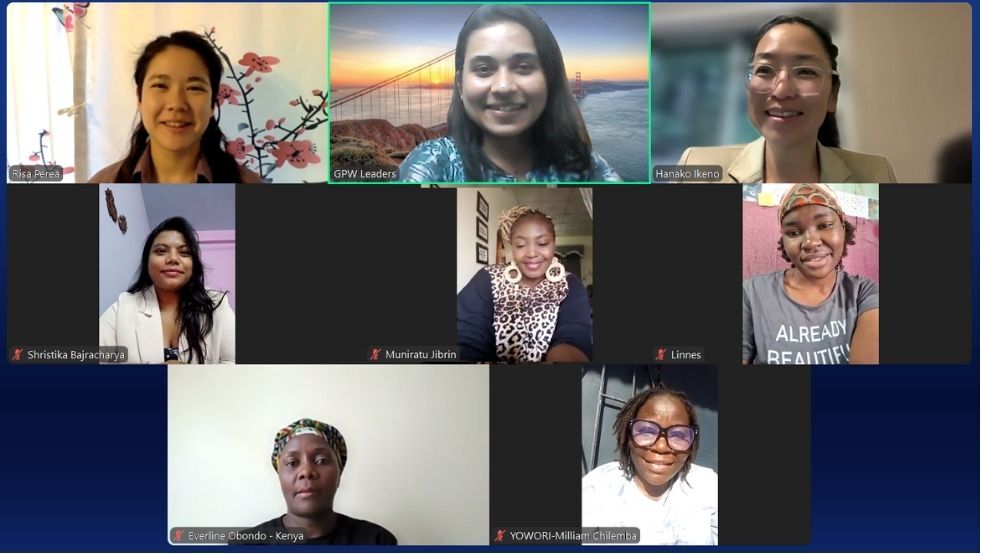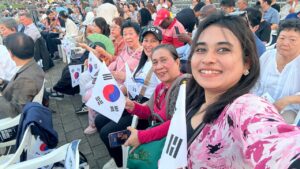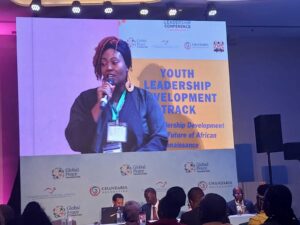Across time zones and borders, a growing circle of women leaders is engaging with a powerful idea: that the future of peace lies not only in politics or policies, but in people; ordinary people, doing extraordinary things in their families and communities.
This belief comes to life in the Korean Dream Study Series, a learning and leadership platform organized by Global Peace Women (GPW). In its fourth session in July 2025, themed “People Power and Peaceful Revolutions,” participants from Kenya, Nigeria, Malawi, Bangladesh, Nepal, and other countries came together online to share stories, reflect on history, and connect the ideals of the Korean Dream to their own lives and local contexts.
“It’s truly amazing to see each of you, so busy with your community work, yet here with heart and vision,” said the session’s host, Tahmina Supti. “This is not just a class; it’s a collective journey toward peace.”
A Global Conversation Rooted in Local Realities
From the outset, the session spotlighted the unique ways participants are advancing peace in their own communities. Muniratu Jibrin shared how she is leading Korean Dream campaigns among rural farmers in northern Nigeria, adapting to limited digital access by mobilizing volunteer coordinators to register community members and share the message of peace through face-to-face engagement.
With schools going on holiday, Muniratu and fellow leader Aisha are planning vibrant summer boot camps for children and parents, using art, local languages, and storytelling to promote peace values and the Korean Dream. “We want to catch them before they get lost in holiday routines,” she said. “It’s a moment to sow seeds of peace in young hearts.”
Everline Obondo from Kenya brought history into the room with her reflection on Nobel laureate Wangari Maathai, who stood alongside mothers of political prisoners in peaceful protest. “She could have stayed home,” Everline noted, “but she chose to use her voice to push for justice. It shows us that whatever we have, our voices and our stories, we can use them for peace.”
Shristika Bajracharya of Nepal shared how her project, conducted through GPW, supported elderly women abandoned by their families by helping them create handmade products and connect to markets. “From being silent about their needs to becoming financially independent, we saw a shift,” she said. “And it all started with listening.”
Milliam Chilemba from Malawi told the story of a young woman born with HIV who used TikTok to destigmatize her status, teach others how to live positively, and create community among other youth facing the same challenge. Her courage to speak out, despite criticism, sparked a cultural shift around health and acceptance.
From Bangladesh, one participant recounted how a student group rallied support for a university caretaker who had lost his job during the COVID-19 lockdown. “It was a small act,” she said. “But it helped a family survive, and inspired others to do the same.”
Linnes from Malawi shared how her college class raised funds for a struggling peer, an initiative that grew and inspired other groups. “It started small, but it showed us how kindness multiplies,” she said.
Together, these stories created a mosaic of leadership, not in official titles, but in acts of service, courage, and compassion.
Learning from the Past, Leading with Vision
The session also connected these lived experiences to historical movements of peaceful revolution. Participants reflected on how the Korean independence movement of 1919, Mahatma Gandhi’s nonviolent resistance in India, and the American civil rights movement were all led by ordinary people driven by moral vision.
“What these movements had in common,” said instructor Risa Perea, “was not just a demand for change, but a clear vision grounded in values. That’s what made the revolutions not only peaceful, but transformational.”
Participants learned how faith communities, families, and youth played pivotal roles in sustaining nonviolent action, and how those lessons remain relevant today.
“It only takes a spark,” added GPW President Hanako Ikeno, drawing from a recent fire safety conversation in her home. “That spark can destroy or it can inspire. Our daily choices, our conversations, and our small acts carry the power to ignite change.”
The Korean Dream: A Vision That Unites
At the heart of the study series is the Korean Dream, a vision articulated by Dr. Hyun Jin Preston Moon, calling for a peaceful, unified Korea built on shared spiritual heritage and moral ideals. But as participants explored, the dream is not confined to Korea. It’s a call to all people, everywhere, to live as One Family under God.
The Korean Dream Study Series serves as both an educational tool and a catalyst for peace. It’s a flagship program of Global Peace Women, in collaboration with the Global Peace Foundation (GPF). Through interactive learning, storytelling, and community building, the series equips women and youth leaders to become moral and innovative change agents in their societies, while advancing the global vision of Korean reunification and peace rooted in shared values. It nurtures leaders who are grounded in values, connected to global struggles, and equipped to act locally.
Find out more about the Korean Dream Study Series.
Sign your support for the Korean Dream: http://globalpeace.info/intl-for-one-korea.






